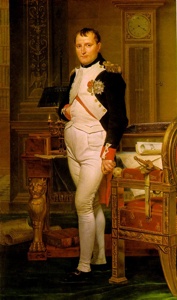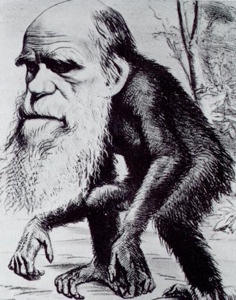 Movies and TV
Movies and TV  Movies and TV
Movies and TV  History
History 10 Extreme Laws That Tried to Engineer Society
 History
History 10 “Modern” Problems with Surprising Historical Analogs
 Health
Health 10 Everyday Activities That Secretly Alter Consciousness
 History
History Top 10 Historical Disasters Caused by Someone Calling in Sick
 Animals
Animals 10 New Shark Secrets That Recently Dropped
 Movies and TV
Movies and TV 10 Forgotten Realities of Early Live Television Broadcasts
 Technology
Technology 10 Stopgap Technologies That Became Industry Standards
 Weird Stuff
Weird Stuff 10 Wild Facts About Taxidermy That You Probably Didn’t Know
 Travel
Travel 10 Beautiful Travel Destinations (That Will Kill You)
 Movies and TV
Movies and TV 10 Box Office Bombs That We Should Have Predicted in 2025
 History
History 10 Extreme Laws That Tried to Engineer Society
 History
History 10 “Modern” Problems with Surprising Historical Analogs
Who's Behind Listverse?

Jamie Frater
Head Editor
Jamie founded Listverse due to an insatiable desire to share fascinating, obscure, and bizarre facts. He has been a guest speaker on numerous national radio and television stations and is a five time published author.
More About Us Health
Health 10 Everyday Activities That Secretly Alter Consciousness
 History
History Top 10 Historical Disasters Caused by Someone Calling in Sick
 Animals
Animals 10 New Shark Secrets That Recently Dropped
 Movies and TV
Movies and TV 10 Forgotten Realities of Early Live Television Broadcasts
 Technology
Technology 10 Stopgap Technologies That Became Industry Standards
 Weird Stuff
Weird Stuff 10 Wild Facts About Taxidermy That You Probably Didn’t Know
 Travel
Travel 10 Beautiful Travel Destinations (That Will Kill You)
Top 10 Common Misconceptions
Following the popularity of our historical misconceptions, we offer you another list – top 10 common misconceptions. Feel free to add your own in the comments.
10. Napoleon was unusually short
Much of the reason for the rumours that Napoleon was a short man (and thus had to compensate by invading countries and becoming ruler of Europe) comes from the confusion between old French feet and Imperial (British) feet. Measured shortly after his death in 1821, Napoleon was recorded at 5ft 2in in French feet, which corresponds to 5ft 6.5in in Imperial feet, or 1.69m. This makes him slightly taller than the average Frenchman of the 19th century. Napoleon’s nickname of ‘le petit caporal’ has also perpetuated the rumour, with non-francophones interpreting ‘petit’ to refer to his height, when it was actually a term of affection referring to his camaraderie with ordinary soldiers.
9. Danish Pastries come from Denmark
Arguably the world’s most misleadingly named food, Danish pastries actually originated in Austria, inspired by Turkish baklava. Their name comes from Danish chef L.C. Klitteng who popularized them in Western Europe and the United States in the early 20th century, including baking it for the wedding of US President Woodrow Wilson in 1915. In Denmark and much of Scandinavia, Danish pastries are called ‘Viennese Bread.’
During the Islamic cartoon controversy of 2006, Danish pastries were renamed ‘Roses of the Prophet Muhammad’ in Iran, due to its association with the offending country.
8. Meteorites are hot when they hit Earth
We’ve all seen the cartoons where a meteor falls to Earth (at which point it becomes a meteorite) with a red-hot tinge and smoke blowing off it in all directions. In truth, small meteorites are cold when they hit Earth – in fact many are found with frost on them. A meteorite has been in the near–absolute zero temperature of space for billions of years, so the interior of it is very cold. A meteor’s great speed is enough to melt its outside layer, but any molten material will be quickly blown off, and the interior of the meteor does not have time to heat up because rocks are poor conductors of heat. Also, atmospheric drag can slow small meteors to terminal velocity by the time they hit the ground, giving them time to cool down.
7. Water spins in different directions
Another bane of cartoons. Toilet water does NOT spin in a given direction due to being in a particular hemisphere of the Earth. That phenomenon only occurs in weather patterns of hundreds of miles in size like hurricanes, due to the rotation of the Earth. So there.
6. Bats are blind
A common misconception perpetuated by its use in metaphors and similes (see also 5), bats actually have fairly normal eyesight, although they are very photosensitive and often dazzled by excessive light. However, bats do often use echolocation in situations where their eyesight fails them, such as times of darkness.
5. Chameleons change colour to match their surroundings
An interesting and fun idea, sure, but simply not true. While chameleons can be perceived to change their colour to match their background, a chameleon’s colour change is actually the expression of the physical and physiological condition of the lizard. Chameleon’s are already naturally camouflaged to match their surroundings, and change their colours depending on their mood, and sometimes a sign of communication. A chameleon that is frightened, for example, will turn black.
4. A duck’s quack doesn’t echo
Sounds ludicrous right? Well this rumour somehow worked up a cult following on the Internet who protested its factuality with an almost religious fervour. It got to the point that a respected scientist actually decided to take valuable time out of his day, when he could be curing cancer or something else unimportant, to test this theory. Trevor Cox, of the University of Salford, England, confirmed what all us logical people knew all along – a duck’s quack DOES echo.
He placed a duck in a reverberation chamber and tested its quack. Sure enough he concluded that a duck’s quack does echo, though the sound that comes back is very soft due to the fading nature of the actual quack. Hooray for science.
3. Hitler was an atheist
“We were convinced that the people needs and requires this faith. We have therefore undertaken the fight against the atheistic movement, and that not merely with a few theoretical declarations: we have stamped it out.”
– Adolf Hitler, Berlin, 1933
Christianity – a religion of peace and tolerance that preaches moral values and love for one’s enemies. Well clearly, from a historical perspective, this has certainly not always been the case, although it’s not so much the religion’s fault as the people who attempt to follow it. With over a billion worldwide adherents, is it really probable that everyone who considers themselves a Christian is a pious, holy and moral human being?
One of the most damning criticisms of Hitler and of atheism in general is that Hitler, as an atheist had no morals and thus could kill freely without care or feeling. Well Hitler was certainly not an atheist; he was born a Roman Catholic, although how religious he actually was is debatable. It is clear though that Hitler was an evil man, and that his religion was irrelevant to his malevolent personality.
In Mein Kampf, Hitler wrote fondly of his experiences in Church festivals, and as leader of the Nazi party made many references to the glory of Christianity in his speeches. Including making references to Jesus’ death at the hand of the Jews in an attempt to rile up anti-Semitic sentiment in his mostly religious audiences. He adopted many aspects of Catholic hierarchy, liturgy and symbolism, though he was very critical of Catholicism in private. In fact, Hitler favoured Protestantism, due to it being open to interpretation. He also ridiculed occultism and neo-Paganism that was relatively popular in Germany at the time.
Strangely enough, Hitler greatly admired the Muslim faith and tradition saying, “the Mohammedan religion too would have been much more compatible to us than Christianity. Why did it have to be Christianity with its meekness and flabbiness?”
2. Humans evolved from monkeys
One of the most common misconceptions about Darwin’s theory of evolution by natural selection is that Darwin claimed we evolved from chimpanzees. Darwin never actually said this, nor will any respectable biologist. This myth was actually spread by religious zealots during the 19th century in order to try and discredit Darwin and promote anti-evolutionism among the religious. Humans and chimpanzees are actually cousins (we share about 94% of our DNA with them) and both evolved from a common ancestor, thought to be Sahelanthropus tchadensis, around 7 million years ago.
1. “Just Desserts”
‘Just desserts’? Does that even make sense in context? The correct phrase is actually ‘just deserts’, and don’t worry if you didn’t know that because you’re not alone, and the chances are that someone much more intelligent than you didn’t know it either. The reason for this misunderstanding comes from the rarely used noun form of the verb ‘to deserve’; something which is deserved is a ‘desert’ (pronounced dessert). It’s hard to tell when the usurpation of the original word was made, but it probably had something to do with witty restaurateurs naming their businesses ‘Just Desserts’ as a pun, and the phrase catching on as the original is forgotten.
Contributor: JT


















